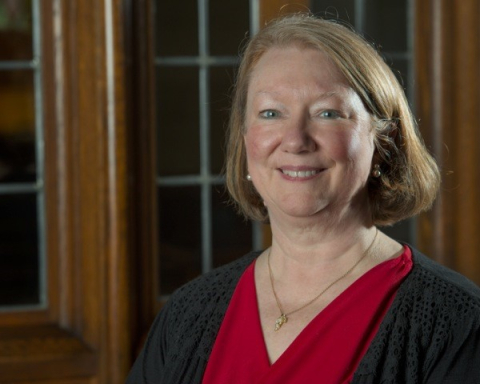Patricia Abbott: "Choral Music Brings People Together"

Next Wednesday, October 25, a joint choir concert will feature two generations of musicians performing music that combines new and old elements.
The program (which features Carl Orff’s Carmina Burana and a new work by composer-in-residence Maria Atallah) is tied together by this concept of the past joined with the present, says Prof. Jean-Sébastien Vallée. “Carmina Burana is one of the best-known works in the choral repertoire. Based on satiric texts from the 11th century, which combine Latin, French and German words, Carl Orff’s masterwork present these texts in an expressive and vivid manner.”
“The concert will open with the premiere of Atallah’s Mar maroun for choir, percussions and flute, which also combines elements from the past and the present. She uses traditional 4th century Syro-maronite hymns as basis for her piece. The combination of these ancient hymns with 21th century compositional techniques creates the perfect companion piece to Carmina Burana.”
To help execute Carmina, the McGill Concert Choir and Schulich Singers will be joined by the English Montreal School Board (EMSB) Chorale. Founded in 1980, this top-notch young ensemble features students from Grade 4 to Secondary V and has performed all over Montreal. To learn more about next week’s collaboration with Schulich ensembles, we spoke to EMSB Chorale conductor (and Schulich course lecturer) Patricia Abbott in a recent email exchange.
Is this concert the first joint performance between McGill choirs and the EMSB choir?
The EMSB Chorale performed Carmina Burana with the Schulich Singers in April 2012 under the direction of Jordan de Souza, and it was a great experience. Of course, our choristers who sang in that concert have grown up and a younger generation of choristers will now get to experience the thrill of singing this music. What’s really exciting for me is that some of our EMSB Chorale alumnae are now studying at McGill – and singing in this concert as McGill students! In fact, we have an alumna singing with McGill whose younger sister in singing in the EMSB Chorale. How great is that!
How do you think a joint performance like this one will be significant to the musical development of the EMSB choir students?
This is a wonderful opportunity for our choristers for so many reasons. It’s a chance for them to sing a work and explore repertoire that we couldn’t do on our own. It also gives our choristers a chance to work with another conductor, and I am really thrilled that they will get to work with Jean-Sébastien Vallée, whom I have known since the beginning of his career. That alone will give them another perspective.
They are also always inspired when working with adult choristers and other professional musicians, and are expected to work to rise to their standards. I’ve witnessed this time and again when we have collaborated with other adult choirs and orchestras – our choristers work hard at learning the notes, singing them well, getting the right colour of vowel and pronunciation, and contributing to the ensemble. They know right away when they first join the choir, often in Grade 4 or 5, that they are not there just to be cute but to take on the artistic responsibility of serving the composer’s intent to the best of their ability.
I know they’re also going to get a kick out of seeing and hearing the percussionists at work. A number of years ago, we did Carmina with Le Grand Choeur de Montréal, and I remember one of my young choristers saying that seeing and hearing the percussionists up close gave her a chance to “feel the fabric of the piece.” I think they will all feel that way!
Why would you say it’s important for people of any age to sing in a choir?
We could spend hours talking about this! I conduct four choirs, all of which have different mandates and demographics. While the repertoire and the level of difficulty of the music may differ from one group to another, the benefits remain the same. Listening to music and being able to appreciate it is wonderful, but being part of the music-making itself is even better.
In the course of a week, I have the privilege of working with choristers from age eight to 88 (including my own mother, whom I have conducted for 35 years), and the feedback I get is quite similar no matter how young or old the chorister is. They love being part of helping to recreate a work of art. They love doing it with others. They love that the collective effort brings about a result they could not achieve on their own. They regularly talk about the sense of well-being and family that being in a choir provides – that it gives them energy even on (perhaps especially on) those days when they feel drained.
There are physical, emotional, spiritual and aesthetic benefits to singing in a choir, and there’s now much scientific research to support those claims. Why shouldn’t everyone get a chance to experience this? I also love the fact that choral music is a barrier-breaker. Take any community choir in town and you will see a range of ages and backgrounds. Choir brings people together, and it does so all over the world. Through choral music, I’ve had the chance of meeting people from all over the world and it has reinforced my belief that music (especially choral music) brings people together.
Hear the McGill Concert Choir, the Schulich Singers and the English Montreal School Board Chorale perform on Wednesday, October 25 at 7:30 p.m. in Pollack Hall. Tickets available for purchase here.